Blood Diamond
 for strong violence and language.
for strong violence and language.
Reviewed by: Joel L. Pearce, J.D.
CONTRIBUTOR
| Moral Rating: | Very Offensive |
| Moviemaking Quality: |
|
| Primary Audience: | Adults |
| Genre: | Crime Romance Drama |
| Length: | 2 hr. 18 min. |
| Year of Release: | 2006 |
| USA Release: |
December 8, 2006 (wide) |
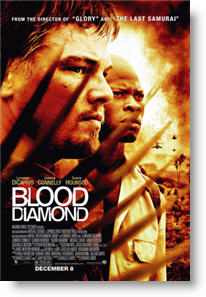
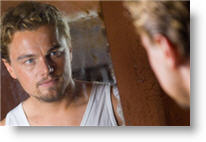
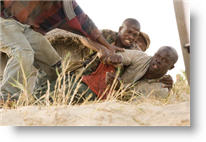
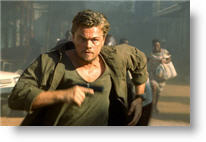
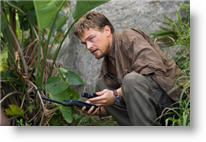
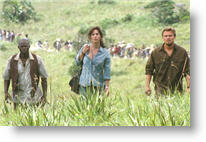
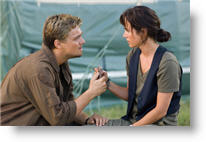
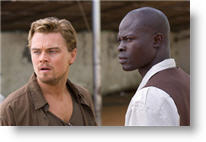

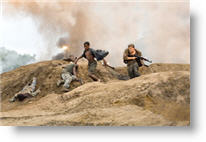
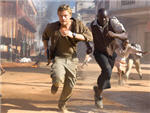
greed
selfishness
loyalty
A single man or woman can help change the world. Read about some who did with faith and God’s help…
Jesus Christ, Noah, Abraham, Joseph, Moses, and David
Are there biblical examples of depression and how to deal with it? Answer
What should a Christian do if overwhelmed with depression? Answer
How can I be and feel forgiven? Answer
Why does God allow innocent people to suffer? Answer
What about the issue of suffering? Doesn’t this prove that there is no God and that we are on our own? Answer
Does God feel our pain? Answer
The Origin of bad—How did bad things come about? Answer
What kind of world would you create? Answer
| Featuring |
|---|
| Leonardo DiCaprio, Djimon Hounsou, Jennifer Connelly, James Purefoy, Arnold Vosloo |
| Director |
|
Edward Zwick |
| Producer |
| Len Amato, Benjamin Waisbren, Kevin De La Noy |
| Distributor |
“Truth. Fortune. Freedom”
“The two stand in the fast-thinning throng of victims, but they speak as if they were alone. Eye to eye, voice to voice, hand to hand, heart to heart, these two children of the Universal Mother, else so wide apart and differing, have come together on the dark highway, to repair home together, and to rest in her bosom” (Charles Dickens, A Tale of Two Cities).
“For what shall it profit a man to gain the whole world but to lose his soul?” (Jesus).
“Blood Diamond,” the latest film from Edward Zwick (“Legends of the Fall”), is the tale of two men, one black, the other white, from the spiritually-dark continent of Africa. It is set in Sierra Leone in 1999, at a time when “each man does what is right in his own eyes.” The land is defiled and filled with violence. Civil war has engulfed the country, and its unparalleled blood-letting is financed with the ill-gotten gains of the black market diamond trade.
The film contrasts the lives of two Africans: Both men are in their early thirties. One (Leonardo DiCaprio) is a mercenary and diamond smuggler, without family, who dreams of making enough money from his black market racketeering to escape the horror and sorrow that Africa has become to him, while the other (Djimon Hounsou) is a family man, a fisherman, raising his small family, who dreams of his son becoming a doctor in order to change Africa from within. “Blood Diamond” is the story of these two men, and the different paths each takes. The film soberly asks the question about whether the things we live for are really worth dying for, and if not why are we doing them.
Leonardo DiCaprio (“Titanic,” “The Departed”) is Danny Archer, a ruthless diamond smuggler from Rhodesia (now Zimbabwe) whose fortune turns south when he is arrested for smuggling while attempting a border crossing. Archer, whose family has been murdered during the Rhodesian civil war, has concluded, as he tells a reporter Jennifer Connelly (“A Brilliant Mind”) that God has “forsaken” Africa, that it’s every man for himself, and that this is why he does what he does for a living. Archer lives quite literally by the law of the jungle, kills without sorrow, steals without regret and at one point threatens to peel the face off Solomon (Hounsou), if Hounsou jeopardizes his safety again. Archer’s identity and value is thus connected to his ability to smuggle diamonds out of Africa and into the black market. People have value to him only insofar as they help him achieve what he wants.
After Danny Archer is arrested and jailed for smuggling the diamonds and relegated to a dark, crowded jail cell, he overhears the extraordinary story of a large, priceless diamond discovered and hidden by a fellow inmate, Solomon. Solomon, it seems, has been kidnapped by rebel forces, and forced to work as slave labor in the diamond quarries. His family has disappeared. In the diamond quarries, he finds the “Blood Diamond,” a large pink diamond, extremely rare and priceless in value. Just prior to his arrest, Solomon hides, then buries, the precious stone.
Upon his release, Danny is soon called to account by the colonel who gave him his start in the smuggling business. The colonel demands compensation for the diamonds that were seized during Danny’s arrest. Repayment of the debt is obligatory in this world, and Danny is compelled by the colonel to find the priceless gem to satisfy the debt. The consequences for not repaying the debt is death.
After much difficulty, Danny manages to recruit Solomon, but is dismayed to find that Solomon cares nothing for the stone. The stone’s only value to Solomon is its usefulness in finding his wife and children. So great is Solomon’s desire to find his family, that this becomes the condition to aiding Danny’s quest find the gem. Danny will help Solomon find his family, and in exchange Solomon will lead Danny to the diamond. Thus, the two men journey together, one to find the blood diamond, the other to find his family.
Danny is a complicated character. Dickinson profoundly described such a man as this: “Sadly, sadly, the sun rose; it rose upon no sadder sight than the man of good abilities and good emotions, incapable of their directed exercise, incapable of his own help and his own happiness, sensible of the blight on him, and resigning him-self to let it eat him away.” In the heat of Africa, with nothing apparently left inside him, Danny’s sin has truly eaten him away. Indeed, he eventually admits that he intended to steal the diamond, all along from Solomon, once the gem was recovered. This admission is part of his salvation. Solomon does not understand Danny’s ability to lie, to kill and to steal. When Solomon asks Danny if he will get married and have children, once they find the diamond, Danny immediately responds “no.” To this, Solomon tells Danny that he is confused. Why would you want to be rich if you only intend to spend the riches on yourself? In Solomon’s mind, money exists to allow men like Danny to marry and have children, how could Danny think otherwise?
Conversely, Solomon is single-minded in his desire to find and rescue his family from destruction. He is like the good Shepherd seeking that which is lost, and this is what moves Danny to change his heart, much like the doomed thief on the Cross who asks Messiah only to “remember” him in His Kingdom. Love is the unanswerable argument. Solomon lives for things worth dying for, while Danny does not. Danny is brought to this realization by the power of Solomon’s love for his son. To tell the reader more would be a major spoiler.
“Blood Diamond” is an excellent film, but it is not for the weak or faint of heart. The violence is graphic, but not gratuitous. The violence is extremely intense, and I can only recommend this film for a mature viewer. There is no sex in the film, not even a scene of kissing. Jennifer Connelly’s character acts as Danny’s bad conscience in her constant efforts to remind Danny that the his actions as a smuggler are helping fuel the insane, genocidal murder that characterized much of the black-on-black tribal violence of the 1990s. She is the voice of reason and of goodness. She weakens his hardened heart by the power of her goodness. She will not save him, however, for this is clearly left for another.
There are several uses of the Lord’s name in a profane manner. The F-word is used, though not as often as one would think. The film is rated “R,” mostly for the unrelenting evil, tragedy and sorrow depicted on film that dares to show what has become of Africa. I, myself, along with other audience members, was moved to tears, especially as the great drama of Solomon’s sacrifice and redemption is set in motion in the film’s final reel; it is clearly a move that changes the heart of the doomed mercenary.
Although the cinematography is breathtaking, it is not a perfect film. At times the dialogue, especially assigned to Jennifer Connelly’s character is a little cumbersome. DiCaprio’s acting is first-rate, but it seemed to me that he had trouble maintaining a consistent south African accent. These are small things considering the epic magnitude of Zwick’s vision. It is not pleasant to look at—the human suffering is staggering—but the film motivated me to pray more diligently for Africa and for the lost. I say this after having worked abroad with the suffering Church for several years. I left the film deeply moved, and eager to go much farther in a world so deeply and profoundly shrouded in violence and terrible darkness.
Violence: Extreme / Profanity: Heavy / Sex/Nudity: None
See list of Relevant Issues—questions-and-answers.


Extremely Offensive / 4
The acting is phenomenal I could have sworn I heard one woman in the audience crying. Dicaprio’s performance of a self-seeking man is one that makes Houston’s performance of a loving father stand out even more. The action in the film keeps it at a very good pace. It comes right out of nowhere, smacks you in the face, and then leaves you just enough time to recover before smacking you in the face again. The story is one of the best parts, because of this movie, because it not only touches on the human aspect of the people over in Africa but on consumers in America as well. We get to see what goes into the mind of some of the people.See all »
Better than Average / 5
Offensive / 4½
Better than Average / 4½
Very Offensive / 5
Average / 4½
Archer is arrested for doing such a thing, and crosses paths with Solomon in a jail, after hearing rumors from an RUF commander that Solomon has found and hidden a diamond of rare value. With certain difficulty, Archer hires Solomon to find the diamond, but also finds that Solomon does not care for the diamond—he only wants to be reunited with his family. So Archer makes a compromise that he will help Solomon find his family in return of Solomon finding the diamond. But they are not the only ones interested in the diamond.See all »
Average / 4
Better than Average / 4½
However, the movie shows a great deal of violence that might frighten kids and other people. This movie certainly has many offensive language usages. The main character also smokes constantly. Overall, I would certainly recommend “Blood Diamond” to mature audiences who are able to bear the violence and everything, even though it will be offensive to certain people.
Offensive / 4½
Excellent! / 5
1. Language was pretty offensive, but well placed. I say this because in most movies they will drop any four letter word they can think of without thinking about it. In this one, the swearing was used in a brutal environment, so I was okay with it. The sexual references were totally un-needed, however.
2. I did not have a problem with the violence personally, but I can think of quite a few people that would. Is was VERY brutal, but it was also expected in a film like this. 3. There was some disturbing drug use that involved kids which was just down right gross. Also, the usual drinking/smoking. Well, in the end, I say do yourself a favor. See this movie. Don’t try to ignore what is going on in other countries. This is real stuff.
Better than Average / 5
I love the quote in the review “Sadly, sadly, the sun rose; it rose upon no sadder sight than the man of good abilities and good emotions, incapable of their directed exercise, incapable of his own help and his own happiness, sensible of the blight on him, and resigning himself to let it eat him away.”
…an excellent review that has changed my mind about seeing this movie in the theater. Thanks!




If you are at all squeamish, I would recommend you watch something else, because this is violent, and the acts of torture are very hard to watch. Overall, though, I think you should see this movie (NO Kids!!!); it’s not a moral movie, although there are some moral people in it who give of themselves. As a Christian, I had a hard time with the language and violent nature of the film, however, missionaries probably see and hear far worse. I highly recommend this film.
My Ratings: Offensive / 4